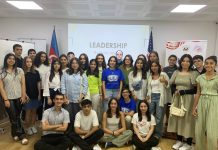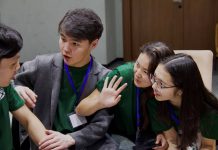Three FLEX alumni, Ivan Vuksanovic ’06, Dina Abazovic ’15, and Zerina Bosovic ’16, worked with the Montenegrin American Youth Alumni Association (MAYAA) and the U.S. Embassy to Montenegro to organize a three-week long virtual workshop called “Civic Education School” for 46 local high school and college students. The aim of the workshop was to raise awareness about the importance of being politically informed and to better understand the role government has in society.
 Zerina was especially motivated to organize this project, saying “I firmly believe that civic education is a necessity in today’s society. I was thrilled that we were able to provide 46 participants with the opportunity to become more educated and engaged citizens.”
Zerina was especially motivated to organize this project, saying “I firmly believe that civic education is a necessity in today’s society. I was thrilled that we were able to provide 46 participants with the opportunity to become more educated and engaged citizens.”
This workshop brought together young people from across Montenegro that were interested in the five themes of the project; human rights, rule of law, environmental protections, anti-corruption, and entrepreneurship. Students were divided into groups to learn about the theme they were most interested in. These groups were then led by mentors, U.S. Government exchange program alumni that work at local organizations and whose professional careers are focused on that field.
The workshop took place over zoom and included presentations given by people who are actively involved in impacting local civil society, such as local journalists, members of parliament, and representatives from the Montenegrin Ombudsman. Participants learned from guest speakers from around the world, by hearing from Anna Patton and Tim Hair, staff at American Councils for International Education in Washington, DC. The two spoke the importance of civic education for young people and the Civic Education Week workshop held annually in Washington DC, that was the inspiration for this event. Additionally, participants had heard from Mr. Lewis Gitter, head of the Political and Economic Affairs section at the U.S. Embassy in Podgorica who spoke about the main goals of the United States foreign policy in the Balkans and Montenegro and the current situation in the Balkans.
 During the closing ceremony participants had the honor of meeting the U.S. Ambassador to Montenegro Judy Reinke. The ambassador shared her experiences of working in the Balkans and explained the importance of social engagement with a focus on youth.
During the closing ceremony participants had the honor of meeting the U.S. Ambassador to Montenegro Judy Reinke. The ambassador shared her experiences of working in the Balkans and explained the importance of social engagement with a focus on youth.
The Civic Education School was a positive experience for both the participants and the organizers. Those in attendence left learning more about what they can do as an individual in their local community to impact civil society. Organizer Dina Abazovic ’15 reminisces that, “Organizing this project in the middle of a pandemic was a real roller coaster, but I am proud of our team that has overcome all obstacles and created a great program for the young people who were involved.’’
Program participants are currently implementing their follow-on projects, aimed at teaching aspects of what they learned at the school with others in their communities. ‘’We ended the dialogue on an optimistic note and concluded that the changes that we are taking are small steps, and we all look forward together to the activities that our participants will carry out after the Civic Education School,’’ shared the president of MAYAA and American Councils Country Representative in Montenegro Ivan Vuksanovic.






